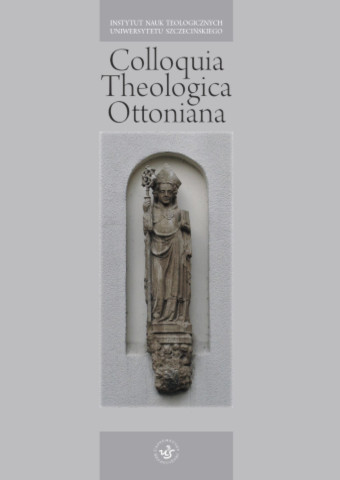
ISSN: 1731-0555
eISSN: 2353-2998
OAI
DOI: 10.18276/cto.2017.2-03




Issue archive /
2/2017
Przyczynek do tłumaczenia słowa ΠΥΛΗ w wersecie Mt 16,18
(Contribution to the translation of the words ΠΥΛΗ from the verse Mt 16,18)
| Authors: |
Daniel
Dzikiewicz
Instytut Teologiczny Seminarium św. Józefa w Wilnie Filia Wydziału Teologicznego Papieskiego Uniwersytetu Laterańskiego w Rzymie |
| Keywords: | translation gate gates power might ecclesia throat parallelism context |
| Data publikacji całości: | 2017 |
| Page range: | 11 (57-67) |
Abstract
This essay has been devoted to the question of translation of the Greek word πύλη from the verse of Matthew 16,18. The first part of the article presents and critically evaluates the two Polish traditions of translation of this word in that passage: the tradition of verbal translation (gate, harrow, gates) and the tradition of metaphorical translation (power, troops, might). The second part of the study on the basis of the linguistic and exegetical arguments proposes to read the word πύλη as the throat, because it is better suited for the literary context of the episode of Matthew 16,18 and to the biblical theology as a whole.
Download file
Article file
Bibliography
| 1. | Alter R., The Art of Biblical Narrative, New York 1985. |
| 2. | Baldick C., Oxford Dictionary of Literary Terms, Oxford 20083. |
| 3. | Dzikiewicz D., Zasady czytania Pisma Świętego, w: Józef Obrembski – kapłan według serca Bożego. Księga pamiątkowa dedykowana w Roku Kapłańskim Księdzu Prałatowi Józefowi Obrembskiemu, red. D. Dzikiewicz, J. Witkowski („Wielcy Ludzie Wileńszczyzny” 1), Wilno 2010, s. 101–118. |
| 4. | Homerski J., Ewangelia według św. Mateusza. Wstęp – przekład z oryginału, komentarz (Pismo Święte Nowego Testamentu III/1), Poznań–Warszawa 1979. |
| 5. | Jaeger H., Wäsch M., Das Buch der Superlative, w: Die Bibel. Daten. Fakten. Wissenswertes, red. H. Jaeger, M. Wäsch, Dillenburg 20132, s. 7–8. |
| 6. | Kratz R., Πύλη, w: Dizionario Esegetico del Nuovo Testamento, red. H. Balz, G. Schneider, t. 2, Brescia 1998, s. 1220–1222. |
| 7. | Nixon R.E., Das Evangelium nach Matthäus, w: Kommentar zur Bibel. AT und NT in einem Band, red. D. Guthrie, J.A. Motyer, Witten 20128, s. 1–53. |
| 8. | Pauritsch K., Parallelismus, w: Praktyczny słownik biblijny, red. A. Grabner-Haider, Warszawa 1995, s. 930–931. |
| 9. | Popowski R., Wielki słownik grecko-polski Nowego Testamentu. Wydanie z pełną lokalizacją greckich haseł, kluczem polsko-greckim oraz indeksem form czasownikowych, Warszawa 19973. |
| 10. | Roloff J., Ἐκκλησία, w: Dizionario Esegetico del Nuovo Testamento, red. H. Balz, G. Schnei der, t. 1, Brescia 1995, s. 1092–1106. |
| 11. | Romizi R., Negri M., Greco antico. Vocabolario greco italiano etimologico e ragionato, Bologna 2001. |
| 12. | Słownik grecko-polski, red. Z. Abramowiczówna, Warszawa 1958. |
| 13. | Viviano B.T., Ewangelia według świętego Mateusza, w: Katolicki komentarz biblijny, red. R.E. Brown, J.A. Fitzmyer, R.E. Murphy, Warszawa 20042, s. 911–980. |
| 14. | Wansbrough H., St Matthew, w: A New Catholic Commentary on Holy Scripture, red. R.C. Fuller, L. Johnston, C. Kearns, Nashville–Camden–New York 19843, s. 902–953 |